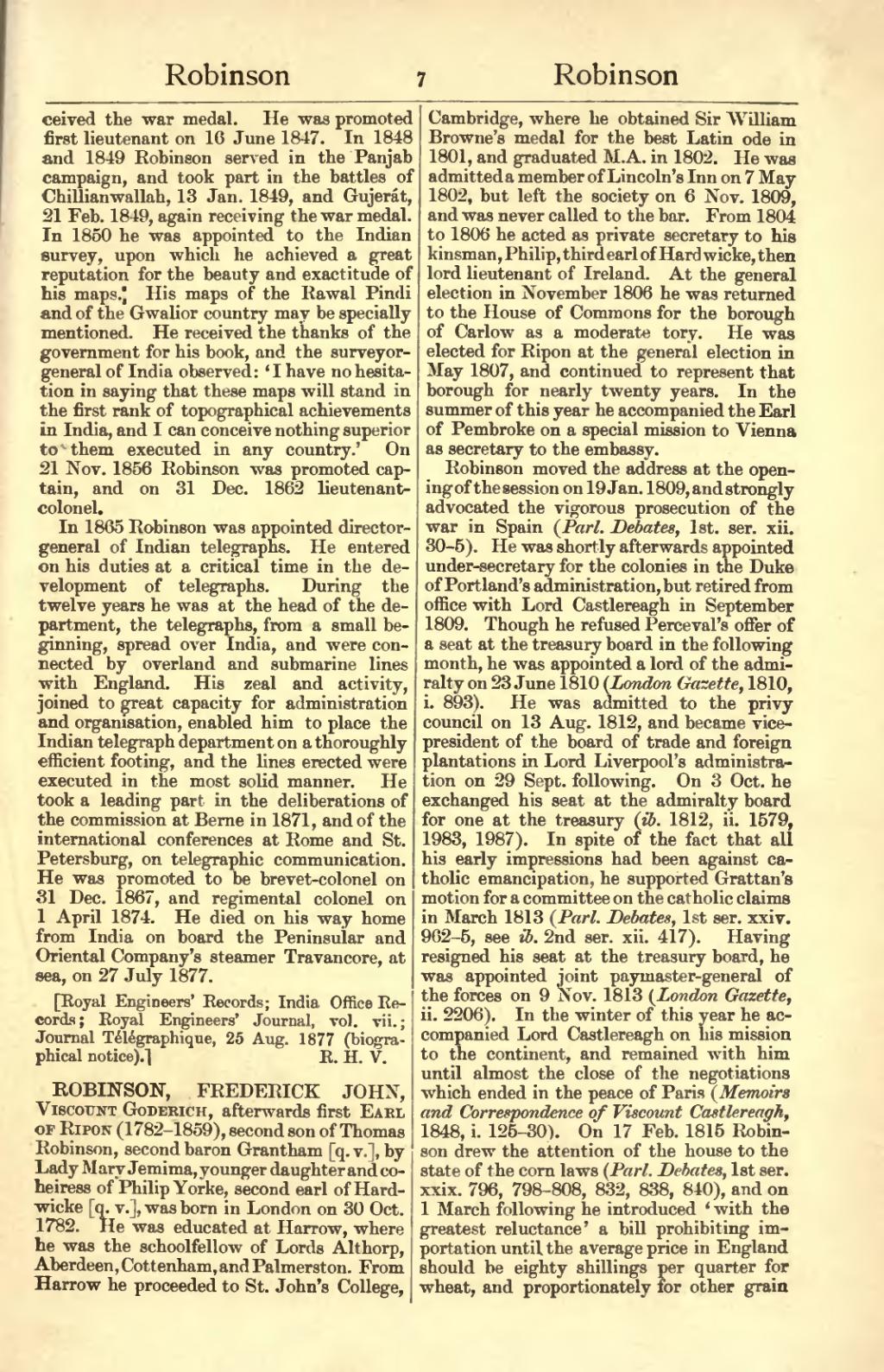ceived the war medal. He was promoted first lieutenant on 16 June 1847. In 1848 and 1849 Robinson served in the Panjab campaign, and took part in the battles of Chillianwallah, 13 Jan. 1849, and Gujerát, 21 Feb. 1849, again receiving the war medal. In 1850 he was appointed to the Indian survey, upon which he achieved a great reputation for the beauty and exactitude of his maps. His maps of the Rawal Pindi and of the Gwalior country may be specially mentioned. He received the thanks of the government for his book, and the surveyor-general of India observed: ‘I have no hesitation in saying that these maps will stand in the first rank of topographical achievements in India, and I can conceive nothing superior to them executed in any country.’ On 21 Nov. 1856 Robinson was promoted captain, and on 31 Dec. 1862 lieutenant-colonel.
In 1865 Robinson was appointed director-general of Indian telegraphs. He entered on his duties at a critical time in the development of telegraphs. During the twelve years he was at the head of the department, the telegraphs, from a small beginning, spread over India, and were connected by overland and submarine lines with England. His zeal and activity, joined to great capacity for administration and organisation, enabled him to place the Indian telegraph department on a thoroughly efficient footing, and the lines erected were executed in the most solid manner. He took a leading part in the deliberations of the commission at Berne in 1871, and of the international conferences at Rome and St. Petersburg, on telegraphic communication. He was promoted to be brevet-colonel on 31 Dec. 1867, and regimental colonel on 1 April 1874. He died on his way home from India on board the Peninsular and Oriental Company's steamer Travancore, at sea, on 27 July 1877.
[Royal Engineers' Records; India Office Records; Royal Engineers' Journal, vol. vii.; Journal Télégraphique, 25 Aug. 1877 (biographical notice).]
ROBINSON, FREDERICK JOHN, Viscount Goderich, afterwards first Earl of Ripon (1782–1859), second son of Thomas Robinson, second baron Grantham [q. v.], by Lady Mary Jemima, younger daughter and coheiress of Philip Yorke, second earl of Hardwicke [q. v.], was born in London on 30 Oct. 1782. He was educated at Harrow, where he was the schoolfellow of Lords Althorp, Aberdeen, Cottenham, and Palmerston. From Harrow he proceeded to St. John's College, Cambridge, where he obtained Sir William Browne's medal for the best Latin ode in 1801, and graduated M.A. in 1802. He was admitted a member of Lincoln's Inn on 7 May 1802, but left the society on 6 Nov. 1809, and was never called to the bar. From 1804 to 1806 he acted as private secretary to his kinsman, Philip, third earl of Hardwicke, then lord lieutenant of Ireland. At the general election in November 1806 he was returned to the House of Commons for the borough of Carlow as a moderate tory. He was elected for Ripon at the general election in May 1807, and continued to represent that borough for nearly twenty years. In the summer of this year he accompanied the Earl of Pembroke on a special mission to Vienna as secretary to the embassy.
Robinson moved the address at the opening of the session on 19 Jan. 1809, and strongly advocated the vigorous prosecution of the war in Spain (Parl. Debates, 1st. ser. xii. 30–5). He was shortly afterwards appointed under-secretary for the colonies in the Duke of Portland's administration, but retired from office with Lord Castlereagh in September 1809. Though he refused Perceval's offer of a seat at the treasury board in the following month, he was appointed a lord of the admiralty on 23 June 1810 (London Gazette, 1810, i. 893). He was admitted to the privy council on 13 Aug. 1812, and became vice-president of the board of trade and foreign plantations in Lord Liverpool's administration on 29 Sept. following. On 3 Oct. he exchanged his seat at the admiralty board for one at the treasury (ib. 1812, ii. 1579, 1983, 1987). In spite of the fact that all his early impressions had been against catholic emancipation, he supported Grattan's motion for a committee on the catholic claims in March 1813 (Parl. Debates, 1st ser. xxiv. 962–5, see ib. 2nd ser. xii. 417). Having resigned his seat at the treasury board, he was appointed joint paymaster-general of the forces on 9 Nov. 1813 (London Gazette, ii. 2206). In the winter of this year he accompanied Lord Castlereagh on his mission to the continent, and remained with him until almost the close of the negotiations which ended in the peace of Paris (Memoirs and Correspondence of Viscount Castlereagh, 1848, i. 125–30). On 17 Feb. 1815 Robinson drew the attention of the house to the state of the corn laws (Parl. Debates, 1st ser. xxix. 796, 798–808, 832, 838, 840), and on 1 March following he introduced ‘with the greatest reluctance’ a bill prohibiting importation until the average price in England should be eighty shillings per quarter for wheat, and proportionately for other grain

